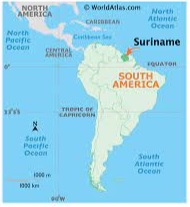International Relations
Indian Pharmacopoeia Recognition in Suriname
- 19 Aug 2023
- 6 min read
For Prelims: Indian Pharmacopoeia Recognition in Suriname, Indian Pharmacopoeia Commission (IPC), Indian Pharmacopoeia, Intellectual Property Rights, Atmanirbhar Bharat.
For Mains: Indian Pharmacopoeia Recognition in Suriname.
Why in News?
Recently, a Memorandum of Understanding (MoU) has been signed between the Indian Pharmacopoeia Commission (IPC) and the Ministry of Health of Suriname, aiming to recognize the Indian Pharmacopoeia (IP) as a standard for medicines in Suriname.
- The signed MoU exemplifies the mutual commitment of India and Suriname to collaborate closely in the realm of medicine regulation.
- This collaboration is rooted in the recognition of the importance of adhering to respective laws and regulations while ensuring the quality of medicines in both countries.
What is the Indian Pharmacopoeia Commission (IPC)?
- IPC is an Autonomous Institution of the Ministry of Health and Family Welfare.
- IPC is created to set standards of drugs in India. Its basic function is to regularly update the standards of drugs commonly required for treatment of diseases prevailing in this region.
- It publishes official documents for improving Quality of Medicines by way of adding new and updating existing monographs in the form of Indian Pharmacopoeia (IP).
- It further promotes rational use of generic medicines by publishing National Formulary of India.
- IP prescribes standards for identity, purity and strength of drugs essentially required from the health care perspective of human beings and animals.
- IPC also provides IP Reference Substances (IPRS) which act as a fingerprint for identification of an article under test and its purity as prescribed in IP.
What are the Key Highlights of the MoU?
- Acceptance of Indian Pharmacopoeia (IP):
- The MoU solidifies the acceptance of the IP as a comprehensive book of standards for medicines in Suriname.
- Streamlined Quality Control:
- The requirement for duplicate testing of medicines within Suriname is eliminated through the acceptance of the Certificate of Analysis issued by Indian Manufacturers adhering to the IP standards.
- This streamlining reduces redundancy, saving time and resources.
- Cost-effective Standards:
- The MoU facilitates access to IP Reference Substances (IPRS) and Impurity standards from the IPC at reasonable costs.
- This provision benefits Suriname by enhancing its quality control analysis procedures.
What is the Significance of the MoU?
- Affordable Medicines:
- The recognition of IP opens doors for the development of generic medicines in Suriname. This translates to increased availability of cost-effective medicines for the citizens of Suriname, aligning with the goal of enhancing public health.
- Economic Advantages:
- For India, the recognition of the Indian Pharmacopoeia in Suriname is a step towards an 'Atmanirbhar Bharat' (self-reliant India). This recognition facilitates the export of Indian medical products, generating foreign exchange earnings and reinforcing India's pharmaceutical industry on the global stage.
- Boosting Indian Pharmaceutical Exports:
- The recognition of IP by Suriname removes the need for duplicative testing and checks, giving Indian drug exporters a competitive edge. The reduction in regulatory hurdles leads to more remunerative trade for the Indian pharmaceutical sector.
- Wider International Recognition:
- The Indian Pharmacopoeia's official recognition has already extended to Afghanistan, Ghana, Nepal, Mauritius, and now, Suriname. This expansion reflects India's efforts to enhance its influence and cooperation in the global pharmaceutical landscape.
What are the Key Facts about Suriname?
- About:
- Suriname is located on the northeastern coast of South America. It is bordered by the Atlantic Ocean to the north, French Guiana to the east, Brazil to the south, and Guyana to the west.
- The capital city of Suriname is Paramaribo, which is situated on the banks of the Suriname River.
- Suriname is a democratic republic with a president as the head of state and government. The country has a multi-party political system.
- Official Language:
- The official language is Dutch, reflecting the country's colonial history. However, several other languages are spoken, including Sranan Tongo (Surinamese Creole), Hindustani, Javanese, and English.
- Formerly a Dutch colony known as Dutch Guiana, Suriname gained independence from the Netherlands on November 25, 1975.
- The official language is Dutch, reflecting the country's colonial history. However, several other languages are spoken, including Sranan Tongo (Surinamese Creole), Hindustani, Javanese, and English.
- Economy:
- The economy of Suriname is diverse, with key sectors including mining (gold, bauxite, oil), agriculture (rice, bananas, timber), and services.
- Suriname is rich in natural resources, particularly gold, bauxite, and recently discovered oil reserves.
Conclusion
- The MoU signed underscores the advancement of pharmaceutical cooperation, quality control, and trade between India and Suriname.
- This strategic collaboration not only benefits both countries' pharmaceutical sectors but also aligns with India's aspiration for self-reliance and leadership in the international pharmaceutical market.







